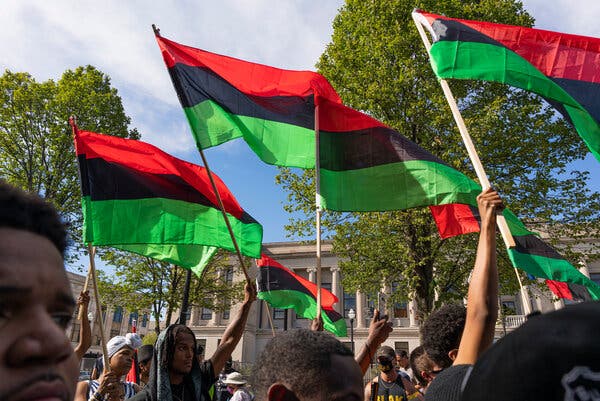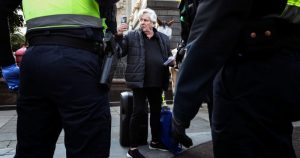KENOSHA, Wis. — Gerald Holmes, a forklift operator from Kenosha, Wis., was so passionate about the importance of the election four years ago that he drove people without rides to the polls. But this year, Mr. Holmes says he is not even planning to vote himself.
The outcome in 2016, when Wisconsin helped seal President Trump’s victory despite him losing the popular vote and amid reports of Russian interference, left Mr. Holmes, 54, deeply discouraged.
“What good is it to go out there and do it?” he said. “It isn’t going to make any difference.”
As protests have unfolded across the country this summer over the death of George Floyd and the police treatment of Black people, activists and Democratic leaders have pleaded with demonstrators to turn their energy toward elections in November.
A block party on Tuesday honoring Jacob Blake, a Black resident of Kenosha who was left paralyzed after being shot in the back by a white police officer, included voter registration booths near where the shooting occurred. And Joseph R. Biden Jr., the Democratic nominee for president, was scheduled to visit Kenosha on Thursday, two days after Mr. Trump appeared in the city in the wake of unrest over the shooting.
But people like Mr. Holmes reflect the challenges that Democrats face as they try to channel their anger over police violence into voting. In interviews with more than a dozen Black residents in the Kenosha area, many said they were outraged over the shooting of Mr. Blake, but some said they had grown dispirited and cynical about the political system. The shooting was further evidence, some residents said, that decades of promises from politicians have done little to alleviate wide racial inequalities or stem police abuses, leaving them seeing little value in one more election.
“Let’s say I did go out and vote and I voted for Biden,” said Michael Lindsey, a friend of Mr. Blake’s who protested for several nights after the shooting. “That’s not going to change police brutality. It’s not going to change the way the police treat African-Americans compared to Caucasians.”
Mr. Lindsey, 29, who lives just outside of Kenosha, said he has never voted in a presidential election and does not plan to start this year, as much as he despises Mr. Trump and is fed up with feeling like he has to live in fear of the police because he is Black.
Many factors have slowed voting. The state’s high rate of incarceration of Black people — among the highest in the nation — strips many African-Americans of their voting rights. Wisconsin’s voter identification law and other strict regulations, such as a shortened early voting period and longer residency requirements compared with 2016, also present major hurdles.
There are other challenges, too. Some residents said they were put off by Mr. Biden’s previous support of tough-on-crime legislation that devastated many Black families. Some said they wrestled with whether he would be any better than Mr. Trump on issues of racism in policing.
“The people feel disengaged,” said Corey Prince, the Wisconsin director for the Outreach Team, a political consulting firm. “They feel disenfranchised. They feel dissuaded from voting.”
That presents a problem for Democrats, who saw Mr. Trump win the state by fewer than 23,000 votes four years ago; turnout among the state’s Black population, which votes overwhelmingly Democratic, sank by nearly 20 percentage points from the previous presidential election. Still, two years ago, turnout among Black voters rose during the midterm elections, helping Democrats to unseat Scott Walker, the incumbent Republican governor.
Community leaders are stressing the importance of not just the presidential election, but also of local races, Diamond Hartwell, a Kenosha native and human rights activist, said. Still, during voter outreach efforts, she said she often heard the refrain, “It doesn’t matter who’s in.”
She said activists were increasing efforts to educate people on the importance of voting and how to do it amid the thicket of rules for registering and getting a proper identification — regulations that many on the left say suppress turnout among minority groups.
During the block party this week near the intersection where Mr. Blake was shot, James Hall, the interim president of the Urban League of Racine and Kenosha, oversaw a table to register voters. Mr. Hall said that older Black residents were among the most likely to vote but that younger people — especially people in their 20s and 30s — were hard to convince. Even the immediate anger and frustration over the shooting in Kenosha did not necessarily ensure more people would vote, he said.
“This noise will energize them, but is it going to translate to votes?” Mr. Hall asked. “I doubt it.”
He approached a young woman and man standing nearby and asked if they wanted to register.
“Does my vote really matter?” the woman asked. Before Mr. Hall could respond, she answered for herself. “I know my voice doesn’t count.”
“It’ll only take five minutes,” Mr. Hall told the man, who initially agreed to register, but then changed his mind and said he would do it later.
Nearly 12 percent of Kenosha’s 100,000 residents are Black. The African-American incarceration rate in Kenosha is about 80 percent higher than in Milwaukee, which has the third-highest rate among large metropolitan areas, according to research by Marc V. Levine, the founding director of the Center for Economic Development at the University of Wisconsin-Milwaukee. Black Kenosha residents are 12 times more likely to be locked up than their white neighbors.
Skepticism about the record of Mr. Biden and his running mate, Senator Kamala Harris of California, on issues of criminal justice are widespread, Mr. Hall said. “They have a history of passing bills or working with the system to incarcerate our people,” he said. “Our people know that, so that’s what makes them unattractive. They haven’t brought anything to the platform to say, ‘Hey, we know we made a mistake in the past, this is what we’re going to do to fix it.’”
Mr. Biden and Ms. Harris have expressed regret for some of their past positions on criminal justice issues, and have cast those decisions as products of the politics of the era. Both have since voiced support for measures that they say will reduce incarceration like decriminalizing marijuana, promoting treatment for nonviolent drug offenses and ending mandatory minimum sentences.
If dissatisfaction with the candidates is turning off Black voters, so is an overall disenchantment with the system, said Dominique Pritchett, a mental health clinician and community activist in Kenosha. Clients have spoken of fears of even going to the polls because of what they see as voter suppression efforts, she said.
“Will I be targeted?” she said clients have asked her. “Will they shred my vote? Psychologically, people just feel like they truly don’t matter.”
Gathered around the front stoop of a clapboard home in Kenosha’s Uptown neighborhood on a recent afternoon, a group of men described their skepticism about voting this fall.
Mike Davis, 42, said the current turmoil over policing increased his desire to see Mr. Trump leave office. But then he thinks back to 2016.
“He’s losing in the polls, everybody says he’s not going to get it, and somehow, some way, he figured out how to get it,” Mr. Davis said. “And I feel like he’s going to do it again. It’s going to be a waste of time.”
Sentiments like that should not be uttered out loud, said his friend, Jamaal Crawford.
“If you believe that, don’t spread that because you’ll have others not voting,” Mr. Crawford, 37, said.
Mr. Crawford said he believed that voting was important and did not want others to be dissuaded.
He last voted many years ago because, for roughly the past 10 years, he has either been incarcerated or under some form of state supervision, he said. In Wisconsin, people with felony records can vote as long as they have completed their sentences and are no longer on probation or parole.
Mr. Crawford, a cook who was laid off because of the pandemic, said he might register now, though he was unsure whether he wanted to go through the process. Still, he said, it is a critical moment given the challenges of police violence.
“Some people are just tired,” he said. “They think it’s a waste of time. But even if it is, we should keep wasting our time until it’s not.”



















